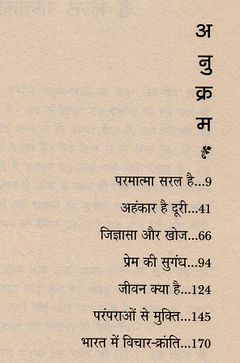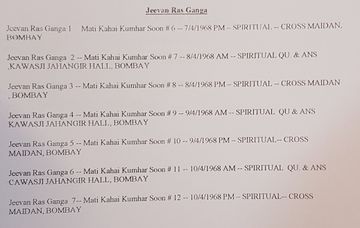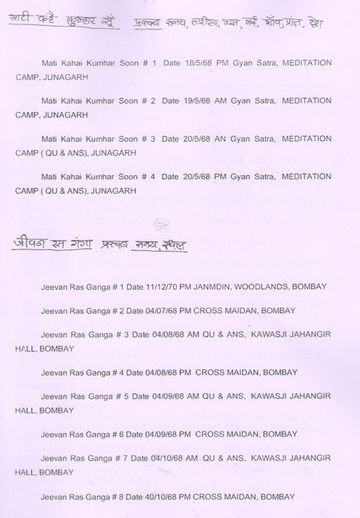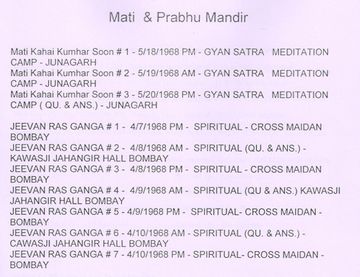Talk:Mati Kahai Kumhar Sun (माटी कहै कुम्हार सूं)
The first sentence of the old discussion here referred to "a lot of information about this book but mostly fragmentary, not in a coherent whole". This could also have been said about the discussion, so it has been re-organized into themes. Within each theme, comments of more than one vintage may appear, so they are time-stamped accordingly. And before any of that, we can have the current understanding of Mati's origins summarized.
Current Understanding
The current understanding, such as it is, derives from Dates and Places input from Jagdish, details below. There are some inconsistencies in the information supplied, so changes may happen.
- 1 May 18 1968 pm Junagarh (GJ) meditation camp
- 2 May 19 1968 am Junagarh (GJ) meditation camp
- 3 May 20 1968 om Junagarh (GJ) meditation camp
- 4 May 20 1968 pm Junagarh (GJ) meditation camp
- 5 Dec 11 1970 pm Woodlands, Bombay Birthday discourse
- 6 Apr 7 1968 pm Cross Maidan, Bombay (same as Jeevan Ras Ganga (जीवन रस गंगा) #1)
- 7 Apr 8 1968 am Kawasji Jahangir Hall, Bombay (same as JRG #2) (Q&A)
- 8 Apr 8 1968 pm Cross Maidan, Bombay (same as JRG #3)
- 9 Apr 9 1968 am Kawasji Jahangir Hall, Bombay (same as JRG #4) (Q&A)
- 10 Apr 9 1968 pm Cross Maidan, Bombay (same as JRG #5)
- 11 Apr 10 1968 am Kawasji Jahangir Hall, Bombay (same as JRG #6) (Q&A)
- 12 Apr 10 1968 pm Cross Maidan, Bombay (same as JRG #7)
Regarding the last seven talks, they are offered as audios differently by osho.com and Osho World. Apparently OW has them as Mati #6-12 and o.com as JRG #1-7. See JRG's talk page regarding that. And these seven talks are on paper apparently only under the name of Mati, not JRG, and not in all editions. -- doofus-9 19:32, 21 May 2019 (UTC)
Deliberations
TOCs

| OW audio titles: | Hind 2011/2014 TOC |
|---|---|
|
1. परमात्मा सरल है |
1. परमात्मा सरल है |
[Original audio TOC ~ June 2014]
Sep 2017 update: With some solid scans of the 2011/2014 Hind edition, we are now in a position to say a bit more: The ambiguity of the dates arises from the fact that the 2014 "edition" is clearly labelled a reprint of the 2011. The ISBN situation may still be a mess, but 9788121605021 (with its hyphens) clearly belongs to Hind 2011/2014. The fact of 191 pages for that issue is held over from previous info, and is close enough to align with the scan info.
The big new thing (such as it is) with the Hind edition info is the chapter titles. It's not radically different but worth noting. It has only seven chapters, as can be seen from its anukram (TOC) page (image above right). Six of them almost correspond to the first seven of the audios above, with Hind having the first five identical (save the above-mentioned small change in ch 2), omitting the 6th, moving the 7th ahead to its 6th and having a completely new title for its 7th, भारत में विचार-क्रांति. I have inserted a second column above for easy comparison. -- doofus-9 17:21, 7 September 2017 (UTC)
TOC of Shailendra's e-book is the same as OW's.--DhyanAntar 09:16, 26 September 2018 (UTC)
Miscellaneous edition stuff
There is a lot of information about this book but mostly fragmentary, not in a coherent whole. As well, there is a great deal of inconsistency, and info leaking from one edition to another. Details about all the edition stuff follow, but first a couple of more general features, which also venture into inconsistency, and which may give an idea of how it's going to go with the editions.
[snipped here was material shifted to "Dates and Places"]
Regarding the editions, the 2003 Rebel edition is also attributed to the ever-mysterious Sadhana Foundation but only Sadhana has an ISBN and the two covers are different, though similar. I have not reproduced the Sadhana cover here since it has a bookseller's proprietary stamp on it.
Still nothing particularly weird about any of that. It is with the Hephaestus and Hind editions that we truly lurch into The Twilight Zone. Besides fairly common things like the pub date changing from one site to another (2011, 2014, unspecified), there is an unprecedented variation and leaking of ISBNs. Most sites, if they report an ISBN at all, will have both the ISBN10 and the ISBN13. Here we have two ISBN13's and two ISBN10's used by Hind for the same book and the same number(!) also used by Hephaestus, and they come in nearly every combination of -13 and -10: 9788121605028, 9788121605028, 8121605024 and 8121605028.
A few other things, to return us back to nearly normal: The subtitle on the 2011/2014 edition translates roughly as "That sex is central in life is just a fact. Your condemnation does not remove it from that center." It is assumed to be on the other cover, though the image resolution is too low to confirm that 100%.
And lastly, there are the good old transliteration issues, and for good measure, one on the Devanagari end. First, that one: कहे (Kahe) reads कहै (Kahai) in the earlier edition images that are available. This may reflect an evolution in the Devanagari spelling of that word rather than a mistake. In any case, it is rendered almost always as Kahe in Roman characters, even with कहै on the cover. Kumhar appears variously as Kumahar and Kumar. And सूं SHOULD be rendered as Sun, not Su, but never is, but sometimes it is Se. The other variations, ie on कहे and कुम्हार, are NOT found in searches, ie Kahe does not find Kahai and vv. They have to be tried each separately. "Su" finds all its variations. -- Sarlo (talk) 10:02, 14 June 2014 (PDT)
And for the record, let it be known that o.com is out there alone in getting its transliteration right, at least on their audiobook page, with "Mati Kahai Kumhar Soon". -- doofus-9 17:05, 11 March 2017 (UTC)
Dates and Places
Osho World and osho.com both have blurbs about the book but they seem to be talking about very different books. Osho World's blurb -- ओशो द्वारा दो साधना शिविरों में दिए गए ग्यारह अमृत प्रवचनों का संकलन -- refers to eleven discourses (not twelve) taken from two different meditation camps. The relevant portion of osho.com's blurb -- ध्यान साधना शिविर, जूनागढ़ में ध्यान-प्रयोगों एवं प्रश्नोत्तर सहित ओशो द्वारा दिए गए चार अमृत प्रवचनों का अपूर्व संकलन -- refers to a single camp at Junagadh, with only four discourses. Okay, must be different editions, with osho.com's much shorter, perhaps the 48-pager from Hephaestus. Not too difficult, is it? Let's see. ~ June 2014
Mar 2017 update: Both osho.com and Osho World have updated their audiobook blurbs. O.com has dropped any mention of a Junagadh camp, so the account above and in the article's description shall have to be the only record of that, but they still have only four discourses. OW still has all twelve but they have corrected the eleven to twelve in the blurb.
O.com's four discourses have the same titles as the first four of OW except #2 is अहंकार है दूरी instead of अहंकार की दूरी: "ego is distance" rather than "distance of ego". If it matters. We might gather then that the first four are the Junagadh camp, the fifth and possibly others from Mumbai and then another camp. ¿Quien sabe? ~ March 2017
The new big deal today [Dec 24 2018, superseded below] is info about dates and locations for the discourses of Jeevan Ras Ganga (जीवन रस गंगा), which also points out that JRG is one of the "camps" referred to above that were sources for Mati. The correspondence is shown below. It can be verified that chapter titles are the same. It seems that this four-day very urban event, with no mention of meditations separate from the talks, was not exactly a camp but in all other respects, it helps out well with filling in the gaps.
- JRG 1 = MKKS 6 7/4/1968 pm Cross Maidan, Bombay
- JRG 2 = MKKS 7 8/4/1968 am Kawasji Jahangir Hall, Bombay
- JRG 3 = MKKS 8 8/4/1968 pm Cross Maidan, Bombay
- JRG 4 = MKKS 9 9/4/1968 am Kawasji Jahangir Hall, Bombay
- JRG 5 = MKKS 10 9/4/1968 pm Cross Maidan, Bombay
- JRG 6 = MKKS 11 10/4/1968 am Kawasji Jahangir Hall, Bombay
- JRG 7 = MKKS 12 10/4/1968 pm Cross Maidan, Bombay
As a bonus, this also helps to clear up the discrepancies between OW's and o.com' blurbs about Mati. Simply, 12 = 4 + 1 + 7, where the "1" is chapter 5. Now all those different numbers make sense.
The only gap remaining in working out Mati's origins is the first four chapters. For that, there are hints and traces of infobits from here and there, suggestive but by no means conclusive. Putting them together . . .
The original blurb from o.com had it that these talks were from a camp in Junagadh. Okay. Today i also re-discovered in Shifting content in Hindi books (source document) that Mati's ch 3 is the same as ch 3 in Rom Rom Ras Peejiye (रोम रोम रस पीजिए). And guess what? Rom Rom was from a camp in Junagadh dist in Gujarat!
But that's as far as we can go with that synchronicity for now. Rom Rom has nine talks, not four, and none of its titles align with Mati's titles. Perhaps audio or text comparison will nail it down and show that only the titles have been changed, but for now, that's all,-- doofus-9 07:56, 24 December 2018 (UTC)



Above info about the JRG connection is not obsolete, but it can be augmented by not one but two new versions of D&Ps from Jagdish. We'll copy the old one from JRG over here to present all three versions together:
There! Isn't that nice?
They are largely in agreement with each other, and some of their differences can be parsed for their relative significance, and so a decent picture emerges. Analysis below:
- MKKS 1 May 18 1968 pm Junagarh
- MKKS 2 May 19 1968 am Junagarh
- MKKS 3 May 20 1968 om Junagarh
- MKKS 4 May 20 1968 pm Junagarh
- MKKS 5 Dec 11 1970 pm Woodlands, Bombay
- JRG 1 = MKKS 6 Apr 7 1968 pm Cross Maidan, Bombay
- JRG 2 = MKKS 7 Apr 8 1968 am Kawasji Jahangir Hall, Bombay (Q&A)
- JRG 3 = MKKS 8 Apr 8 1968 pm Cross Maidan, Bombay
- JRG 4 = MKKS 9 Apr 9 1968 am Kawasji Jahangir Hall, Bombay (Q&A)
- JRG 5 = MKKS 10 Apr 9 1968 pm Cross Maidan, Bombay
- JRG 6 = MKKS 11 Apr 10 1968 am Kawasji Jahangir Hall, Bombay (Q&A)
- JRG 7 = MKKS 12 Apr 10 1968 pm Cross Maidan, Bombay
Some decisions need to be made about discourse numbers, both in Junagarh -- "Junagadh" is a variant transliteration, not a problem at this moment -- and in Bombay. Regarding numbering in Junagarh, it feels more satisfying to have all four talks mentioned, and so the dates from ver 2 have been adopted, if only provisionally. The schedule in Junagarh has a big gap with either version, so we have to wonder about what else might be there. Possibly some lost discourses, of which no trace remains.
In choosing between the two options in the talks connected with JRG, we have other sources nudging us toward omitting Mati #5 as a part of JRG. These are the audiobook folks, who maintain that JRG and/or its Mati equivalent have only seven audios. So we'll go with the ver 1 numbering, as above. The consolation here is that Mati #5 seems to be able to rest firmly anyway in its spot on Osho's birthday in 1970, with or without JRG. This decision can be provisional as well.
All this leaves Mati's connection with Rom Rom as a bit of an outlier. There is only the one source for that, and with only discourse #3 mentioned, offering nothing for #1, 2 and 4. And 1967 doesn't fit very well either. So this connection can go, again provisionally, into storage.
The question of whether we can call JRG a camp remains moot, but perhaps there were ways in which participants were immersed in a camp-like meditative atmosphere for those days even with its big urban backdrop ... or whatever. Nothing much at stake with this.
The third version mentions "Prabhu Mandir", presumably a reference to Prabhu Mandir Ke Dwar Par (प्रभु मंदिर के द्वार पर), but as there is nothing substantial pointed to, we can't do anything with it. Prabhu Mandir is fairly well established in 1969 too, so nothing can really be made of this for now. More for the storage bin! -- doofus-9 01:10, 21 May 2019 (UTC)
Discourse #5 and its ramifications
And there is a curious infobit from Neeten's Osho Source Book (Bombay section) concerning the time the discourses were given. He has it that discourse #5 was given on Dec 11, 1970, on the occasion of Osho's 40th birthday. Which is great to learn, but that date would be his 39th. More likely it WAS his 40th, making it Dec 11, 1971, more likely because, according to the Camps timeline, he would have just finished a camp in Ahmedabad on Dec 7, 1970, the classic one when he inaugurated the massive Geeta-Darshan (गीता-दर्शन) series, and there is a big gap in the Dec 1971 timeline. ~ June 2014
Above analysis of the info from Neeten, figuring out that the mistake should be resolved by saying it was his 40th and in Dec 1971, was based solely on a gap in the talks timeline, which looks a bit fatuous now. The significance of the birthday discourse story was that a big change happened that night in the way that Osho was addressing his people, his salutations at the beginning and end. These changes can be verified as having happened in some camps in 1971, so the date (1970) is correct and "40th" is what's wrong. -- doofus-9 07:17, 4 May 2016 (UTC)
- Latest info from Shailendra confirms that this milestone talk WAS given on Osho's birthday in 1970 and was first compiled in Jeevan Rahasya (जीवन रहस्य) as #13 but later transferred to Mati, as #5. -- doofus-9 18:49, 13 September 2018 (UTC)
- One more tiny thing about that is remembering that there are different conventions regarding the phrase "nth birthday". To me, "40th birthday" means when someone turns 40. The other way starts with the actual day the person is born and calls that the 1st birthday, and so on, and this is a perfectly sensible way of reckoning such things. So in that system, Osho's 40th birthday would indeed have been in 1970. So i was wrong all the way down the line on that one. 07:56, 24 December 2018 (UTC)
media status
Osho.com has 4 MP3s, OW has 12 under this title. Also compare Talk:Jeevan Ras Ganga (जीवन रस गंगा) and Talk:Jeevan Rahasya (जीवन रहस्य).
The audio needs to be checked against the book's texts: what is what? --Sugit (talk) 12:18, 7 January 2019 (UTC)
